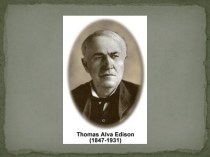- Главная
- Разное
- Бизнес и предпринимательство
- Образование
- Развлечения
- Государство
- Спорт
- Графика
- Культурология
- Еда и кулинария
- Лингвистика
- Религиоведение
- Черчение
- Физкультура
- ИЗО
- Психология
- Социология
- Английский язык
- Астрономия
- Алгебра
- Биология
- География
- Геометрия
- Детские презентации
- Информатика
- История
- Литература
- Маркетинг
- Математика
- Медицина
- Менеджмент
- Музыка
- МХК
- Немецкий язык
- ОБЖ
- Обществознание
- Окружающий мир
- Педагогика
- Русский язык
- Технология
- Физика
- Философия
- Химия
- Шаблоны, картинки для презентаций
- Экология
- Экономика
- Юриспруденция
Что такое findslide.org?
FindSlide.org - это сайт презентаций, докладов, шаблонов в формате PowerPoint.
Обратная связь
Email: Нажмите что бы посмотреть
Презентация на тему Daniel Defoe
Содержание
- 2. Daniel Defoe born Daniel Foe, was an
- 3. Daniel Foe was probably born in the
- 4. His parents were Presbyterian dissenters; he was
- 5. Writing
- 6. Defoe's first notable publication was An Essay
- 7. In 1709 Defoe authored a rather lengthy
- 8. The extent and particulars of Defoe's writing
- 9. From 1719 to 1724, Defoe published the
- 10. His novels include:Robinson Crusoe
- 11. Скачать презентацию
- 12. Похожие презентации
Daniel Defoe born Daniel Foe, was an English trader, writer, journalist, pamphleteer and spy, who gained fame for his novel Robinson Crusoe. Defoe is notable for being one of the earliest proponents of the novel, as
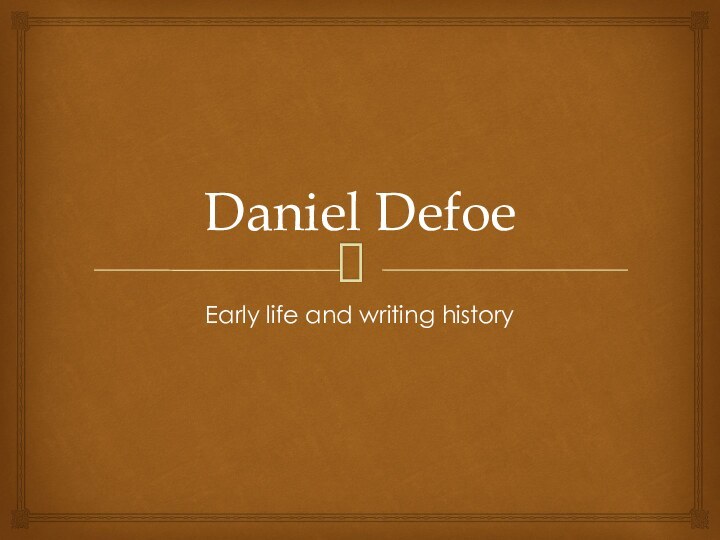
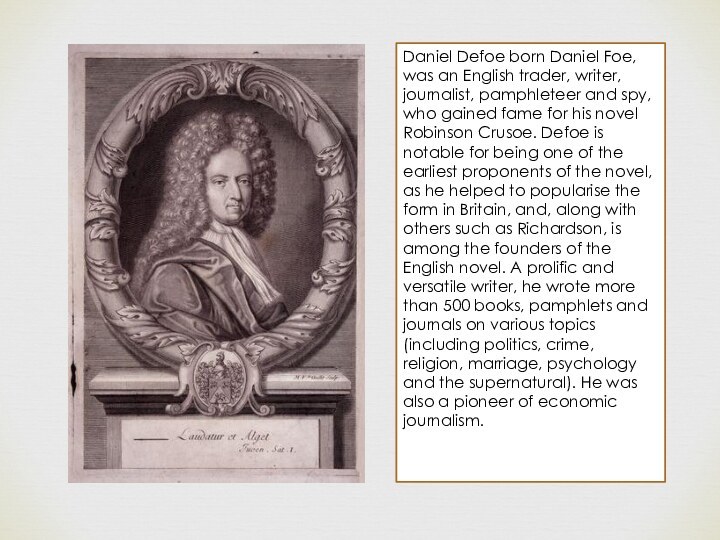
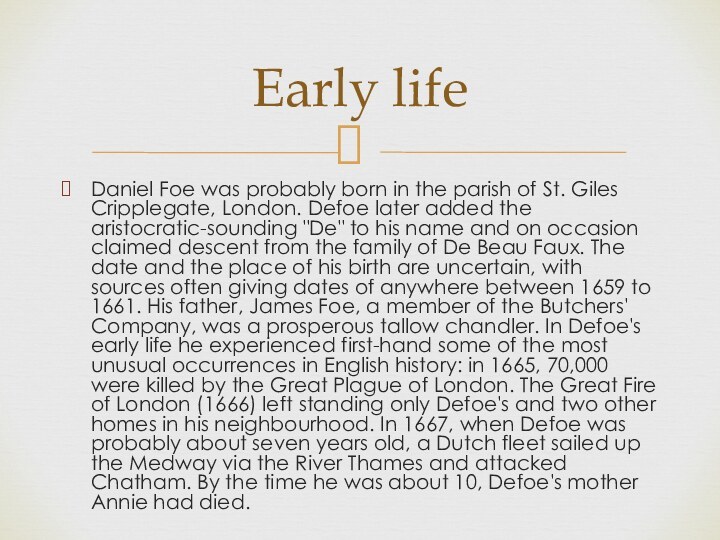
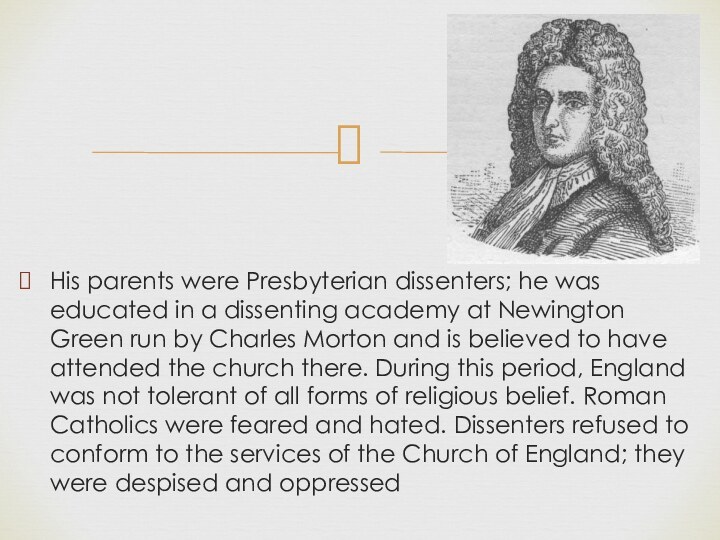

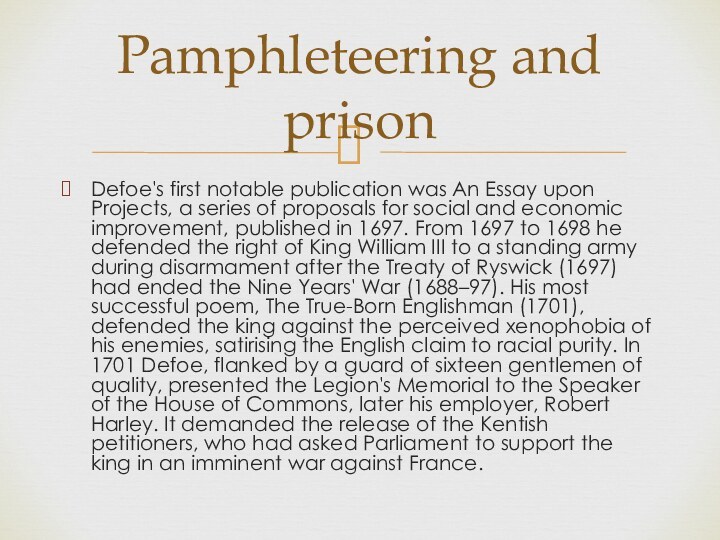
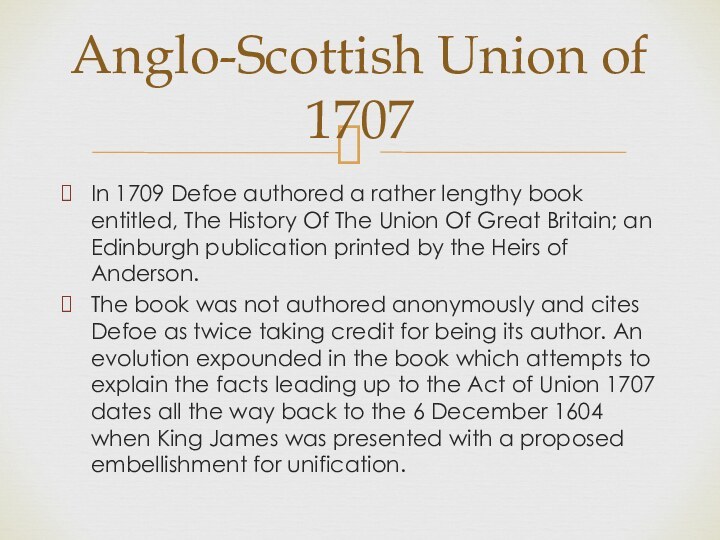
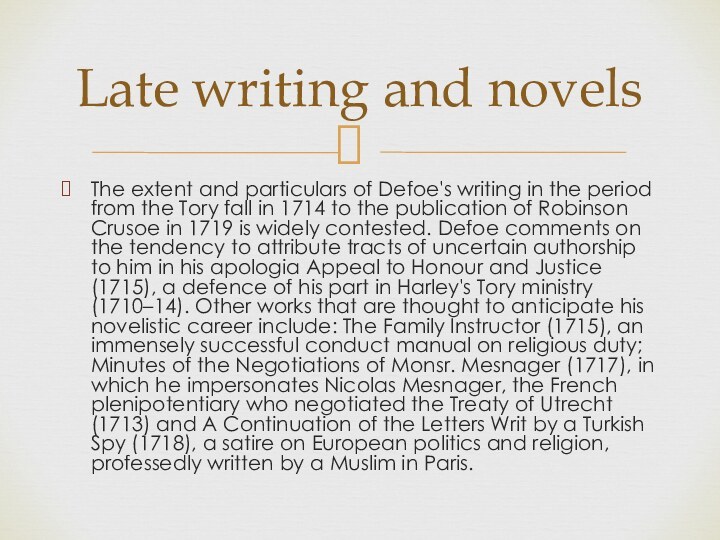
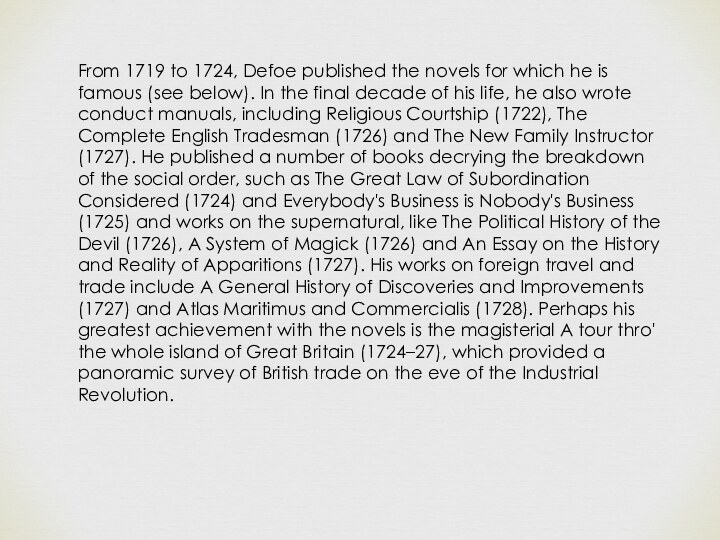
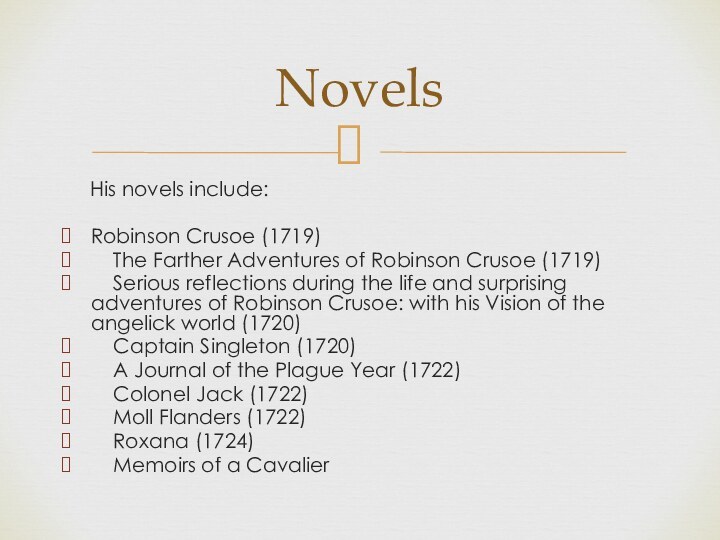
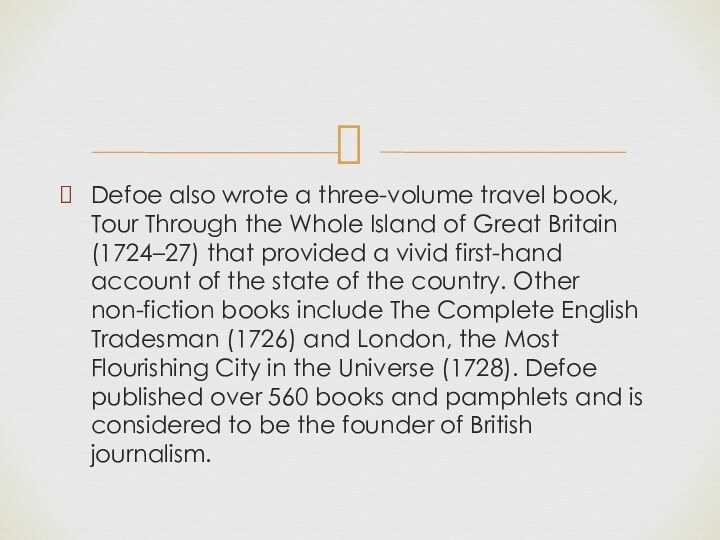
Слайд 3 Daniel Foe was probably born in the parish
of St. Giles Cripplegate, London. Defoe later added the
aristocratic-sounding "De" to his name and on occasion claimed descent from the family of De Beau Faux. The date and the place of his birth are uncertain, with sources often giving dates of anywhere between 1659 to 1661. His father, James Foe, a member of the Butchers' Company, was a prosperous tallow chandler. In Defoe's early life he experienced first-hand some of the most unusual occurrences in English history: in 1665, 70,000 were killed by the Great Plague of London. The Great Fire of London (1666) left standing only Defoe's and two other homes in his neighbourhood. In 1667, when Defoe was probably about seven years old, a Dutch fleet sailed up the Medway via the River Thames and attacked Chatham. By the time he was about 10, Defoe's mother Annie had died.Early life
Слайд 4 His parents were Presbyterian dissenters; he was educated
in a dissenting academy at Newington Green run by
Charles Morton and is believed to have attended the church there. During this period, England was not tolerant of all forms of religious belief. Roman Catholics were feared and hated. Dissenters refused to conform to the services of the Church of England; they were despised and oppressedСлайд 6 Defoe's first notable publication was An Essay upon
Projects, a series of proposals for social and economic
improvement, published in 1697. From 1697 to 1698 he defended the right of King William III to a standing army during disarmament after the Treaty of Ryswick (1697) had ended the Nine Years' War (1688–97). His most successful poem, The True-Born Englishman (1701), defended the king against the perceived xenophobia of his enemies, satirising the English claim to racial purity. In 1701 Defoe, flanked by a guard of sixteen gentlemen of quality, presented the Legion's Memorial to the Speaker of the House of Commons, later his employer, Robert Harley. It demanded the release of the Kentish petitioners, who had asked Parliament to support the king in an imminent war against France.Pamphleteering and prison
Слайд 7 In 1709 Defoe authored a rather lengthy book
entitled, The History Of The Union Of Great Britain;
an Edinburgh publication printed by the Heirs of Anderson.The book was not authored anonymously and cites Defoe as twice taking credit for being its author. An evolution expounded in the book which attempts to explain the facts leading up to the Act of Union 1707 dates all the way back to the 6 December 1604 when King James was presented with a proposed embellishment for unification.
Anglo-Scottish Union of 1707
Слайд 8 The extent and particulars of Defoe's writing in
the period from the Tory fall in 1714 to
the publication of Robinson Crusoe in 1719 is widely contested. Defoe comments on the tendency to attribute tracts of uncertain authorship to him in his apologia Appeal to Honour and Justice (1715), a defence of his part in Harley's Tory ministry (1710–14). Other works that are thought to anticipate his novelistic career include: The Family Instructor (1715), an immensely successful conduct manual on religious duty; Minutes of the Negotiations of Monsr. Mesnager (1717), in which he impersonates Nicolas Mesnager, the French plenipotentiary who negotiated the Treaty of Utrecht (1713) and A Continuation of the Letters Writ by a Turkish Spy (1718), a satire on European politics and religion, professedly written by a Muslim in Paris.Late writing and novels
Слайд 9 From 1719 to 1724, Defoe published the novels
for which he is famous (see below). In the
final decade of his life, he also wrote conduct manuals, including Religious Courtship (1722), The Complete English Tradesman (1726) and The New Family Instructor (1727). He published a number of books decrying the breakdown of the social order, such as The Great Law of Subordination Considered (1724) and Everybody's Business is Nobody's Business (1725) and works on the supernatural, like The Political History of the Devil (1726), A System of Magick (1726) and An Essay on the History and Reality of Apparitions (1727). His works on foreign travel and trade include A General History of Discoveries and Improvements (1727) and Atlas Maritimus and Commercialis (1728). Perhaps his greatest achievement with the novels is the magisterial A tour thro' the whole island of Great Britain (1724–27), which provided a panoramic survey of British trade on the eve of the Industrial Revolution.
Слайд 10
His novels include:
Robinson Crusoe (1719)
The Farther Adventures of Robinson Crusoe (1719)
Serious reflections during the life and surprising adventures of Robinson Crusoe: with his Vision of the angelick world (1720)Captain Singleton (1720)
A Journal of the Plague Year (1722)
Colonel Jack (1722)
Moll Flanders (1722)
Roxana (1724)
Memoirs of a Cavalier
Novels





















